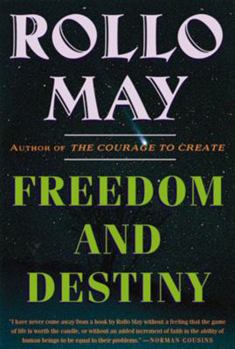Freedom and Destiny
Select Format
Select Condition 
Book Overview
May is an existential analyst who deservedly enjoys a reputation among both general and critical readers as an accessible and insightful social and psychological theorist. . . . Freedom's characteristics, fruits, and problems; destiny's reality; death; and therapy's place in the confrontation between freedom and destiny are examined. . . . Poets, social critics, artists, and other thinkers are invoked appropriately to support May's theory of freedom...
Format:Paperback
Language:English
ISBN:0393318427
ISBN13:9780393318425
Release Date:January 1999
Publisher:W. W. Norton & Company
Length:288 Pages
Weight:0.72 lbs.
Dimensions:0.7" x 5.5" x 8.2"
Customer Reviews
4 ratings
No More Victim
Published by Thriftbooks.com User , 17 years ago
Our freedom comes when we take up the courage to create our lives and become authentic agents. This isn't about "Dr. Phil"-ish self-help... this about the awareness that we create our lives and that it is only when we make conscious choices that we can truly be free!
As The River Needs The Banks To Flow, So...
Published by Thriftbooks.com User , 24 years ago
As the river needs the banks to control its flow, so the soul needs destiny to channel freedom. This metaphor captures the nature of this fascinating book for me. May does not disparage one over the other. For him, license is the corruption of freedom, and fate is the corruption of destiny. He states that true psychological freedom grows out of destiny (or having a destination) and in having a destiny, we are free to grow in spirit and in mind.I underlined as I read. It seems to be the best way to read a book by May. He has a cogent writing style and never lags. (I particularly enjoyed his blasting of the behavioralist school of psychology, but that's just my thing.) Any student of psychology should read this book; May has provided a balance in therapy, he writes to establish the fulcrum which should hold the conflicts and conflicting ideas in level balance. Take the time to sift this book. I hope that you will find it as valuable as I have.
existential psychology at its best...
Published by Thriftbooks.com User , 24 years ago
...and an antidote to so much of the responsibility-shifting, victim-thinking, lack of accountability, determinism, and just plain whining we do these days--not to mention the inflated notion that freedom is somehow an unlimited thing without conditions or limits. May's study delineates the relation of freedom to the givens of destiny.
May's mature musings on our existential dilemma
Published by Thriftbooks.com User , 24 years ago
Admittedly, it has been many years since I thoroughly read this book (almost twenty to be exact), but I will try to share some of my recollections with potential readers. The central premise and fundamental focus is on the paradoxical fact that we humans are both free AND determined. Not predestined, as Hillman weakly argues in THE SOUL'S CODE, but determined by our inherent limitations, talents, vulnerabilities, circumstances, etc. These determining factors are what May terms "destiny." Freedom--true autonomy, the liberty to choose, to consciously decide how to relate to one's destiny--is to be found not in the absence of psychobiological determinism or quasi-autonomous "complexes," but in spite of them: "Freedom," says May, "is thus not the opposite to determinism. Freedom is the individual's capacity to know that he is the determined one, to pause between stimulus and response and thus to throw his weight, however slight it might be, on the side of one particular response among several possible ones." Especially important is May's recognition of how chronic repression of one's anger or rage--the daimonic--impairs one's freedom, preventing this sometimes necessary and healthy response to authentic encounters with destiny. As he puts it: "The concept of destiny makes the experience of anger necessary. The kind of person who 'never gets angry' is, we may be sure, the person who also never encounters destiny. When one encounters destiny, one finds anger automatically rising in one, but as strength. Passivity will not do. . . . Encountering one's destiny requires strength, whether the encounter takes the form of embracing, accepting, or attacking. Experiencing the emotional state of anger and conceiving of destiny means that you are freed from regarding yourself as too 'precious'; you are able to throw yourself into the game, whatever it may be, without worrying about picayune details. . . . Constructive anger is one way of encountering destiny." And all authentic creativity arises from this deeply existential encounter. A seventy-year-old May philosophically muses here on many other topics too, such as the vengeful roots of narcissism, modern sexuality, meditation, mysticism, as well as the relationships between freedom and anxiety and joy and despair. While not as rich as LOVE AND WILL, or powerful as POWER AND INNOCENCE, FREEDOM AND DESTINY is an important volume in May's valuable body of work, and can be well recommended.





